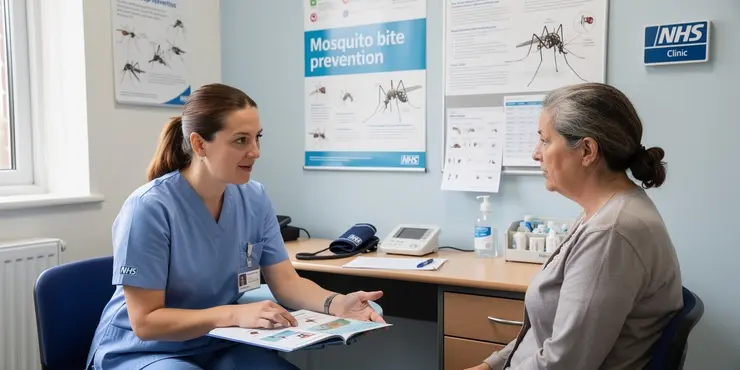
Find Help
More Items From Ergsy search
-

How long is the incubation period for the Marburg virus?
Relevance: 100%
-

What is the Marburg Virus?
Relevance: 66%
-

How is the Marburg virus transmitted?
Relevance: 58%
-

What is the typical progression of Marburg virus disease?
Relevance: 56%
-

What are the symptoms of Marburg virus disease?
Relevance: 54%
-

Is the Marburg virus related to the Ebola virus?
Relevance: 53%
-

Is there a vaccine for Marburg virus?
Relevance: 53%
-

Where was the Marburg virus first discovered?
Relevance: 52%
-

What research is being done on the Marburg virus?
Relevance: 50%
-

Can Marburg virus disease be prevented?
Relevance: 49%
-

How is Marburg virus disease diagnosed?
Relevance: 49%
-

How can healthcare workers protect themselves from Marburg virus infection?
Relevance: 49%
-

Can Marburg virus disease recur after recovery?
Relevance: 48%
-

What is the mortality rate of Marburg virus disease?
Relevance: 48%
-

Has Marburg virus caused any major outbreaks?
Relevance: 47%
-

Are there any countries at higher risk for Marburg virus outbreaks?
Relevance: 46%
-

How do health authorities confirm a Marburg virus outbreak?
Relevance: 46%
-

What measures are being taken to control Marburg virus outbreaks?
Relevance: 46%
-

How long is the incubation period for chickenpox?
Relevance: 46%
-

What is Nipah Virus?
Relevance: 33%
-

What is the Ebola virus?
Relevance: 33%
-

Is there a cure for Nipah Virus?
Relevance: 27%
-

How soon do symptoms appear after infection?
Relevance: 26%
-

How is Chikungunya virus transmitted?
Relevance: 26%
-

Can Nipah Virus cause outbreaks?
Relevance: 26%
-

What are the symptoms of Nipah Virus infection?
Relevance: 25%
-

Can Nipah Virus cause neurological complications?
Relevance: 24%
-

Can Nipah Virus be transmitted from person to person?
Relevance: 24%
-

Is Super Flu a new strain of virus?
Relevance: 23%
-

What should someone from the UK do if they think they have Zika virus after traveling?
Relevance: 22%
-

Irregular periods - BSL
Relevance: 22%
-
Is Zika virus screened for in blood transfusions?
Relevance: 22%
-

What is West Nile Virus?
Relevance: 21%
-

Can men in the UK transmit Zika virus if infected?
Relevance: 21%
-

What animals are natural hosts of the Marburg virus?
Relevance: 21%
-

What are the treatment options for Marburg virus disease?
Relevance: 21%
-

What should I do if I think I have West Nile Virus?
Relevance: 21%
-

What is the notice period for redundancy?
Relevance: 21%
-

Is there a vaccine for the Zika virus?
Relevance: 20%
-

Is Zika virus present in the UK?
Relevance: 20%
Introduction to Marburg Virus
The Marburg virus is a highly virulent pathogen belonging to the same family as the notorious Ebola virus, the Filoviridae family. It is responsible for causing severe viral hemorrhagic fever in humans. Understanding the incubation period of the Marburg virus is crucial for managing outbreaks and implementing effective public health measures.
Incubation Period of the Marburg Virus
The incubation period is defined as the time interval between exposure to the virus and the onset of symptoms. For the Marburg virus, this period typically ranges from 2 to 21 days. However, most cases develop symptoms within 5 to 10 days post-exposure. This variation depends on several factors, including the route of transmission, the viral dose, and the individual's immune response.
Factors Influencing the Incubation Period
The length of the incubation period can be influenced by numerous factors. For instance, the mode of transmission can play a significant role. Direct contact with infected bodily fluids, contaminated materials, or exposure to certain animal reservoirs can affect how quickly symptoms manifest. Additionally, the severity of exposure and the specific strain of the virus may alter the duration before symptoms appear.
Importance of Understanding the Incubation Period
Comprehending the incubation period is essential for controlling the spread of the virus. It assists in determining the duration for monitoring individuals who have been exposed to the virus. Those who may have come into contact with Marburg virus patients are often observed for symptoms throughout the maximum incubation period of 21 days. This measurement ensures that any emergence of symptoms is promptly managed to prevent further transmission.
Public Health Measures and Quarantine
Given the potential for the Marburg virus to cause severe outbreaks, public health officials rely on knowledge of the incubation period to establish effective quarantine protocols. In suspected or confirmed cases, isolation measures are critical to halt the spread within communities. Quarantine, along with contact tracing of exposed individuals, becomes a pivotal response strategy.
Conclusion
The incubation period of the Marburg virus is a critical element in the fight against its spread. By understanding that this period can extend from 2 to 21 days, health professionals can better plan and implement strategies for emergency response. As with many infectious diseases, early detection and prompt intervention remain vital to reducing the impact of the Marburg virus on affected populations.
What is the Marburg Virus?
The Marburg virus is a very dangerous sickness. It is like the Ebola virus. It makes people very sick with a fever and bleeding. Knowing how long it takes to get sick after catching the Marburg virus helps doctors stop it from spreading.
How Long Until You Get Sick?
The time from when you catch the virus to when you get sick is called the incubation period. For the Marburg virus, this time can be from 2 to 21 days. Most people get sick in 5 to 10 days. Different things, like how the virus gets into the body and how strong the dose is, can change this time.
What Can Change This Time?
How long it takes to get sick can change because of different things. How you catch the virus matters a lot. If you touch body fluids from someone sick or touch things they've used, you might get sick faster. How much virus gets into your body and the kind of virus can also change how quickly you get symptoms.
Why is Knowing the Time Important?
Knowing the incubation period helps stop the virus from spreading. It tells doctors how long to watch people who might be sick. If someone may have caught the Marburg virus, doctors watch them for 21 days. This way, they can help quickly if the person gets sick, so no one else catches it.
Stopping the Virus From Spreading
To stop the Marburg virus from spreading, health workers use what they know about the incubation period. They make rules to keep sick people away from others. People who may be sick are kept alone, and health workers find others who might have touched them. This is important to keep everyone safe.
Summary
Knowing how long it takes to get sick after catching the Marburg virus is important. It can take 2 to 21 days. By knowing this, doctors can make plans to stop the virus. Like with other sicknesses, finding the sickness early and acting fast helps keep people healthy.
Frequently Asked Questions
What is the typical incubation period for the Marburg virus?
The typical incubation period for the Marburg virus ranges from 2 to 21 days.
Can the incubation period for the Marburg virus be longer than 21 days?
No, the incubation period for the Marburg virus is generally between 2 and 21 days as observed in clinical cases.
What factors might affect the length of the incubation period for Marburg virus?
Factors such as the mode of transmission, the viral load at the time of exposure, and individual immune responses can affect the incubation period.
Why is it important to know the incubation period for the Marburg virus?
Knowing the incubation period is important for monitoring exposed individuals, implementing quarantine measures, and managing outbreaks effectively.
Does the Marburg virus incubation period vary between different individuals?
Yes, the exact incubation period can vary between individuals due to factors like immune response and the amount of virus they were exposed to.
What happens after the incubation period of the Marburg virus ends?
After the incubation period ends, symptoms such as fever, chills, headache, and muscle pain typically begin to appear.
Is the Marburg virus contagious during the incubation period?
Individuals are not usually contagious during the incubation period, as symptoms have not yet developed.
How is the incubation period for the Marburg virus determined?
The incubation period is determined through epidemiological studies of past outbreaks and by observing known cases of the disease.
Can the Marburg virus incubation period be used to predict the onset of symptoms?
Yes, once the approximate time of exposure is known, the incubation period can help predict when symptoms may begin.
Are there any methods to shorten the incubation period of the Marburg virus?
There are no known methods to intentionally shorten the incubation period of the Marburg virus. Treatment focuses on managing symptoms and supporting recovery.
Is hospitalization required during the incubation period of the Marburg virus?
Hospitalization is not required during the incubation period unless symptoms develop that warrant medical care.
How can one monitor for Marburg virus symptoms during the incubation period?
Monitoring includes regular temperature checks and being vigilant for any early symptoms such as fever or fatigue.
Has the incubation period for the Marburg virus changed over the years?
The incubation period has remained consistent in studies, typically between 2 and 21 days, although observations can be refined with more data.
Can animals have a different incubation period for the Marburg virus?
The incubation period in animals may vary based on species, but for primates, it is similar to humans, roughly 2 to 21 days.
What symptoms indicate the end of the incubation period for Marburg virus?
The appearance of symptoms such as fever, headache, joint and muscle aches signals the end of the incubation period.
How does one confirm exposure to the Marburg virus during its incubation period?
Confirmation usually requires tracing contact with infected individuals or laboratory testing if symptoms develop post incubation.
Can preventive measures during the incubation period affect the course of Marburg virus?
Preventive measures such as isolation and supportive care can help contain the spread and manage the severity once symptoms manifest.
What is the average length of the incubation period for Marburg virus?
The average incubation period is typically around 5 to 9 days within the 2 to 21 days range.
Has the Marburg virus incubation period always been known?
The incubation period was identified through research and studies of past outbreaks and clinical data.
Is the incubation period of Marburg virus similar to other filoviruses?
Yes, Marburg virus shares a similar incubation range with other filoviruses like the Ebola virus, which also has a 2 to 21 days incubation period.
How long does it take for Marburg virus to make you sick?
The time between getting the Marburg virus and feeling sick is usually between 2 and 21 days.
Can the waiting time for Marburg virus be more than 21 days?
The incubation period is how long it takes for signs of the virus to show after you catch it.
For the Marburg virus, this time is usually not over 21 days.
It's good to talk to a doctor if you have questions. They can give you the best advice.
No, if someone gets the Marburg virus, they usually start to feel sick between 2 and 21 days after they catch it.
What things might change how long it takes for Marburg virus to show symptoms?
How a virus spreads, how much virus you get, and how strong your body is at fighting germs can change how long it takes for someone to feel sick after catching a virus.
Why do we need to know how long it takes to get sick from Marburg virus?
It is important to know how long it takes for an illness to show up after someone is exposed. This helps doctors keep an eye on people who might be sick, decide if they need to stay at home, and stop the illness from spreading to others.
To help understand this better, you can:
- Use pictures or charts to see how the illness spreads.
- Ask someone to explain it to you in simple words.
- Use apps that read text aloud to you.
Do people get sick from the Marburg virus at different times?
Some people might get sick quickly after they catch the Marburg virus. Others might take longer to get sick. Each person is different.
It can be helpful to use things like pictures, simple words, or ask a friend to explain. These can make it easier to understand.
Yes, the time for the virus to show up can be different for each person. This is because of things like how strong their body is and how much virus they got.
What happens after the waiting time for the Marburg virus is over?
The Marburg virus is a sickness you can catch. It has a waiting time called an "incubation period." This means the virus is in your body, but it might not make you sick right away.
When the waiting time is over, you may start feeling sick. Look out for signs like fever, headache, sore muscles, or feeling very tired. If you feel sick, you should see a doctor.
You can use a calendar or ask someone to help you remember the waiting time. It's important to pay attention to how you feel.
After waiting for a while, signs of being sick show up. You might feel hot (fever), shiver (chills), have a sore head (headache), and your muscles might hurt (muscle pain).
Can you catch the Marburg virus before symptoms show?
People usually can't spread germs to others when they don't have symptoms yet. This is because they are not sick yet.
How do we find out how long it takes for Marburg virus to show symptoms?
When someone catches the Marburg virus, it takes time before they feel sick. This time is called the "incubation period."
Doctors find out how long this time is by watching people who got the virus.
They look at:
- When the person got the virus.
- When the person began to feel sick.
By keeping track of this, doctors can tell how long the incubation period is.
If you want to learn more, you can:
- Talk to a doctor.
- Read simple books about viruses.
- Use apps that explain things simply.
The time it takes to show signs of being sick, called the incubation period, is found out by looking at past disease outbreaks and by watching people who already have the sickness.
Can the Marburg virus waiting time help us know when someone will feel sick?
Yes, if you know when you were near someone who is sick, you can guess when you might start feeling sick by using something called the incubation period.
Can we make the Marburg virus work faster in the body?
Scientists are studying the Marburg virus to find out how it works. Right now, there is no easy way to make it get better or worse quicker. Tools like pictures or videos can help us learn more.
There is no way to make the waiting time for the Marburg virus to show up shorter. Doctors help by taking care of symptoms and helping people get better.
Is a hospital stay needed when waiting to see if someone has the Marburg virus?
Here is the question in easier words: Should someone stay in the hospital while waiting to see if they have the Marburg virus?
Here are some ways to help understand:
- Ask a doctor or nurse if you are not sure.
- Use pictures or videos to explain the virus.
- Talk to someone who can help you understand big words.
You don't need to stay in the hospital if you are waiting to see if you get sick. But if you start feeling unwell, you might need to see a doctor and go to the hospital then.
How can you watch for Marburg virus signs before getting sick?
The time before you feel sick is called the incubation period.
During this time, you might not know you have the virus.
Look out for signs like:
- Fever
- Headache
- Feeling weak
- Muscle pain
Helpful hints:
- Write down how you feel each day.
- Talk to a doctor if you notice changes.
Keep an eye on how warm your body is by taking your temperature often. Watch out for feeling very tired or having a fever, as these could be early signs of getting sick.
Has the time Marburg virus takes to show symptoms changed?
When a person catches the Marburg virus, it takes some time before they feel sick. This is called the "incubation period." Scientists want to know if this time has changed over the years.
To understand better, you can:
- Ask a doctor or nurse.
- Read simple health books.
- Watch a video made for kids about viruses.
The time it takes to show signs of being sick (called the incubation period) is usually between 2 and 21 days. We can learn even more with more information.
Do animals get sick from the Marburg virus at different times?
Animals can get sick. The time between getting sick and showing signs depends on the animal. For monkeys and humans, it takes about 2 to 21 days.
You can use pictures or videos to learn more. You can also ask a grown-up to help explain.
How do you know when the Marburg virus is starting to make someone sick?
When you start to feel things like a fever, headache, and sore muscles and joints, it means that the time for the virus to grow inside your body is over. These are signs that you might be getting sick.
How can you know if you have come into contact with the Marburg virus while it’s in your body but not making you sick yet?
If you think you have been near someone with the Marburg virus but you are not sick yet, here are some things you can do:
- Talk to a doctor: They can help you know if you need any tests.
- Get a blood test: This can show if the virus is in your body.
- Watch for symptoms: Keep an eye out for feeling sick, like a fever or feeling very tired.
Using pictures and speaking with someone you trust can also help understand information better.
To know for sure if someone is sick, doctors might talk to people who have been around sick people. They might also do tests at a lab if a person starts showing signs of being sick after some time has passed.
To make reading easier, you can:
- Use a finger or a ruler to follow the words on the page.
- Break down big words into smaller parts and say each part slowly.
- Ask someone to read with you and help with tricky words.
- Use text-to-speech tools if you like listening to words.
Can we stop Marburg virus from getting worse by taking steps before it starts?
Sometimes, it helps to do things early to stop illness from getting really bad. This can be true for the Marburg virus too. Here is what we can do:
- Wash hands often with soap and water.
- Stay away from people who are sick.
- Wear a mask to protect yourself.
Remember to ask an adult or doctor if you have questions. They can help explain more!
We can stop the spread of sickness by keeping sick people away from others. We also help them feel better with good care.
How long does it take for Marburg virus to make someone sick?
The Marburg virus can make you sick after a person catches it. This "waiting time" is called the incubation period.
On average, it takes about one week for Marburg virus symptoms to show up after being infected.
If you want to learn more, you can use picture charts or talk to a helper to understand better.
On average, it takes about 5 to 9 days for something to grow or show symptoms. This can happen anytime from 2 to 21 days.
Do we always know how long it takes for the Marburg virus to make you sick?
Scientists and doctors looked at other times people got sick to find out how long germs stay in the body before making you feel ill. This is called the incubation period.
Does Marburg virus take the same time to make you sick as other similar viruses?
The Marburg virus is a lot like the Ebola virus. Both viruses can make people sick in the same amount of time. This time is from 2 to 21 days after you are infected.
Useful Links
This website offers general information and is not a substitute for professional advice.
Always seek guidance from qualified professionals.
If you have any medical concerns or need urgent help, contact a healthcare professional or emergency services immediately.
Some of this content was generated with AI assistance. We’ve done our best to keep it accurate, helpful, and human-friendly.
- Ergsy carfully checks the information in the videos we provide here.
- Videos shown by Youtube after a video has completed, have NOT been reviewed by ERGSY.
- To view, click the arrow in centre of video.
- Most of the videos you find here will have subtitles and/or closed captions available.
- You may need to turn these on, and choose your preferred language.
- Go to the video you'd like to watch.
- If closed captions (CC) are available, settings will be visible on the bottom right of the video player.
- To turn on Captions, click settings .
- To turn off Captions, click settings again.
More Items From Ergsy search
-

How long is the incubation period for the Marburg virus?
Relevance: 100%
-

What is the Marburg Virus?
Relevance: 66%
-

How is the Marburg virus transmitted?
Relevance: 58%
-

What is the typical progression of Marburg virus disease?
Relevance: 56%
-

What are the symptoms of Marburg virus disease?
Relevance: 54%
-

Is the Marburg virus related to the Ebola virus?
Relevance: 53%
-

Is there a vaccine for Marburg virus?
Relevance: 53%
-

Where was the Marburg virus first discovered?
Relevance: 52%
-

What research is being done on the Marburg virus?
Relevance: 50%
-

Can Marburg virus disease be prevented?
Relevance: 49%
-

How is Marburg virus disease diagnosed?
Relevance: 49%
-

How can healthcare workers protect themselves from Marburg virus infection?
Relevance: 49%
-

Can Marburg virus disease recur after recovery?
Relevance: 48%
-

What is the mortality rate of Marburg virus disease?
Relevance: 48%
-

Has Marburg virus caused any major outbreaks?
Relevance: 47%
-

Are there any countries at higher risk for Marburg virus outbreaks?
Relevance: 46%
-

How do health authorities confirm a Marburg virus outbreak?
Relevance: 46%
-

What measures are being taken to control Marburg virus outbreaks?
Relevance: 46%
-

How long is the incubation period for chickenpox?
Relevance: 46%
-

What is Nipah Virus?
Relevance: 33%
-

What is the Ebola virus?
Relevance: 33%
-

Is there a cure for Nipah Virus?
Relevance: 27%
-

How soon do symptoms appear after infection?
Relevance: 26%
-

How is Chikungunya virus transmitted?
Relevance: 26%
-

Can Nipah Virus cause outbreaks?
Relevance: 26%
-

What are the symptoms of Nipah Virus infection?
Relevance: 25%
-

Can Nipah Virus cause neurological complications?
Relevance: 24%
-

Can Nipah Virus be transmitted from person to person?
Relevance: 24%
-

Is Super Flu a new strain of virus?
Relevance: 23%
-

What should someone from the UK do if they think they have Zika virus after traveling?
Relevance: 22%
-

Irregular periods - BSL
Relevance: 22%
-
Is Zika virus screened for in blood transfusions?
Relevance: 22%
-

What is West Nile Virus?
Relevance: 21%
-

Can men in the UK transmit Zika virus if infected?
Relevance: 21%
-

What animals are natural hosts of the Marburg virus?
Relevance: 21%
-

What are the treatment options for Marburg virus disease?
Relevance: 21%
-

What should I do if I think I have West Nile Virus?
Relevance: 21%
-

What is the notice period for redundancy?
Relevance: 21%
-

Is there a vaccine for the Zika virus?
Relevance: 20%
-

Is Zika virus present in the UK?
Relevance: 20%


